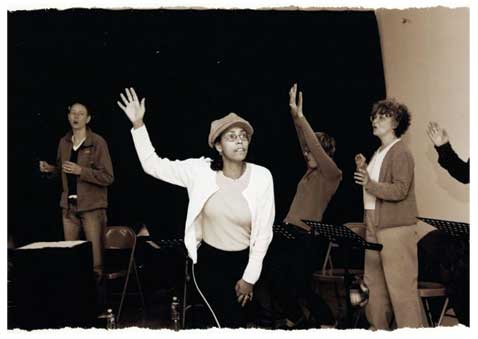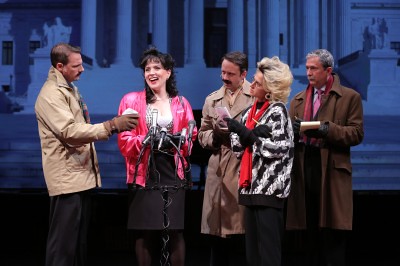
New York’s Elevator Repair Service makes its San Francisco debut with Arguendo, a verbatim recounting of a Supreme Court case, at Z Space. Photos by Joan Marcus
For those of us with no ear for legalese, for whom courtroom scenes in TV shows and movies induce narcolepsy, the premise of Elevator Repair Service’s Arguendo does not sound promising. This celebrated and intrepid New York company, most famous for its word-for-word production of The Great Gatsby (the eight-hour Gatz), turns its attention to our highest court for a verbatim account of a 1991 case, Barnes v. Glen Theatre Inc., that dealt with issues of public nudity, more specifically the nude dancers at the South Bend, Ind., Kitty Kat Lounge and Glen Theatre. If you haven’t heard of this case, not to worry. It wasn’t exactly Brown v. The Board of Education, but it did delve into what is and isn’t considered freedom of expression and whether or not it’s OK for people to dance naked in public.
As might be expected, this is not your run-of-the-mill verbatim courtroom drama. If it were, the audience, even the lawyers, would be asleep. Instead, director John Collins and his fantastic troupe of five energetic actors pull out all the stops to create the liveliest, most irreverent courtroom imaginable.While the lawyers make their cases – Ben Williams as the Petitioner and Mike Iveson as the Respondent – the justices of the Rhenquist court (White, Marshall, Blackmun, Stevens, O’Connor, Scalia, Kennedy and Souter) interrupt with intermittent intelligence, but mostly they’re depicted here as black-robed children – bored, distracted, annoyed and playful. They do not seem to be the country’s font of judicial wisdom but rather petty, quirky goofballs who seem drunk on their power. That’s pretty entertaining to watch.
Collins begins the show on the steps of the courthouse with a stripper (Maggie Hoffman) proudly stating to the assembled press corps how much she enjoys erotic dancing and how such dancing truly is a form of expression. What follows is 80 minutes of expertly and inventively staged courtroom dancing (on a simple set with ramps by David Zinn). The justices (played by Iveson, Vin Knight, Susie Sokol and Williams), in their wheeled chairs and robes, zip around the small performance space and torture the lawyers (also entertaining) and each other.
Adding to the dynamism of the piece is a rear projection wall that zips through legal texts and references like an old-fashioned microfiche machine on 21st-century steroids (the media software is by The Office for Creative Research and the vide designer is Ben Rubin). The projections are such a strong presence in the piece that they even take a bow along with actors at show’s end.
As the show progresses, it gets more manic, the theatrical gestures growing bolder and bolder, and when the full-frontal nudity happens, it’s not even that surprising (but it’s still pretty funny and couldn’t be more integral to the proceedings). Apparently it’s not all that difficult to make the Supreme Court and its machinations look ridiculous.
Under it all, of course, is a serious tussle with the First Amendment, and the issues raised on both sides offer some food for thought in between the delicious morsels of zany theatricality.
Arguendo (the title is apparently a bit of legalese meaning “for the sake of argument”) is fresh and sharp and bursting with intelligent satire. It’s a great introduction to Elevator Repair Service and, with any luck, it will pave the way for a Bay Area presentation of (a fully clothed) Gatz.
FOR MORE INFORMATION
Elevator Repair Service’s Arguendo continues through Nov. 2 at Z Space, 450 Florida St., San Francisco. Tickets are $25-$50. Call (866) 811-4111 or visit www.zspace.org.

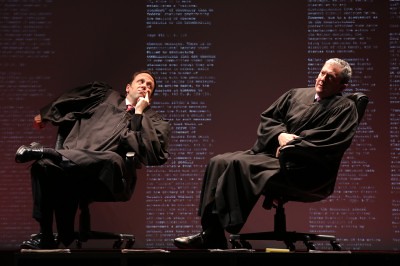
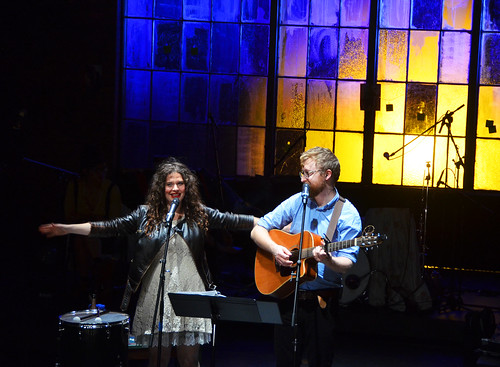
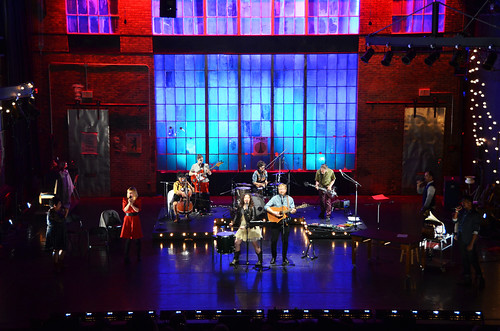

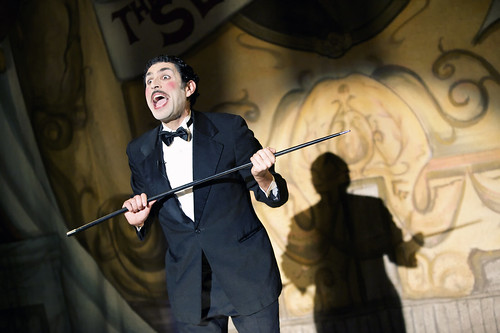
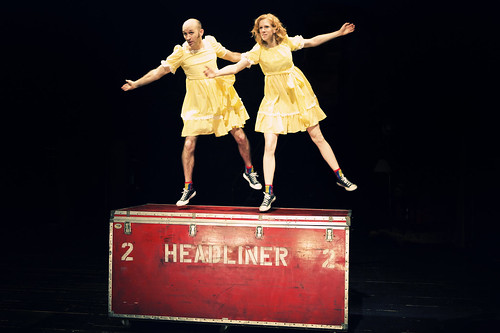
 “Unfortunately, director Gordon Greenberg, who had delighted audiences on the East Coast with past productions of The Baker’s Wife, had a conflicting obligation,” said 42nd Street Moon artistic director Greg MacKellan. “His production of Stephen Schwartz’s Working has been scheduled for the Old Globe Theatre at the same time we would have done The Baker’s Wife. We hope to include the show in next season’s lineup, and meanwhile we will replace it with `High Spirits.’ As it happens, there will be a major Broadway revival of Blithe Spirit with Angela Lansbury, Christine Ebersole and Rupert Everett at the same time we are doing the musical version.”
“Unfortunately, director Gordon Greenberg, who had delighted audiences on the East Coast with past productions of The Baker’s Wife, had a conflicting obligation,” said 42nd Street Moon artistic director Greg MacKellan. “His production of Stephen Schwartz’s Working has been scheduled for the Old Globe Theatre at the same time we would have done The Baker’s Wife. We hope to include the show in next season’s lineup, and meanwhile we will replace it with `High Spirits.’ As it happens, there will be a major Broadway revival of Blithe Spirit with Angela Lansbury, Christine Ebersole and Rupert Everett at the same time we are doing the musical version.”
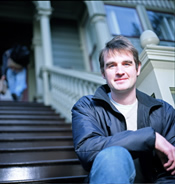 T.I.C. Trenchcoat in Common in January at the Magic Theatre.
T.I.C. Trenchcoat in Common in January at the Magic Theatre.


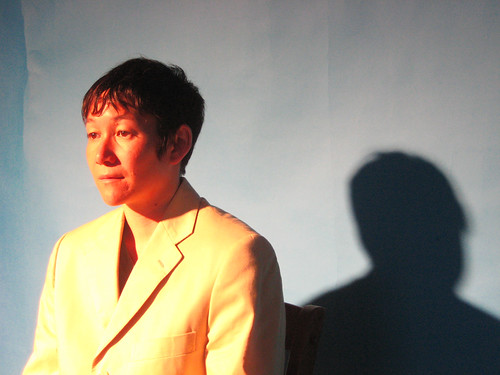 “For the character of Joey, the solution is a lobotomy,” Szlasa says. “He figures that’s the sexy way out. He hires a caretaker before he self-lobotomizes, and the caretaker is a songwriter. That’s where the music comes in.”
“For the character of Joey, the solution is a lobotomy,” Szlasa says. “He figures that’s the sexy way out. He hires a caretaker before he self-lobotomizes, and the caretaker is a songwriter. That’s where the music comes in.”

 Baldwin’s story, published in 1957 and collected in the 1965 book, Going to Meet the Man, follows two brothers in 1950s Harlem. One is a schoolteacher and family man. The other is a jazz pianist with a troubled past.
Baldwin’s story, published in 1957 and collected in the 1965 book, Going to Meet the Man, follows two brothers in 1950s Harlem. One is a schoolteacher and family man. The other is a jazz pianist with a troubled past.